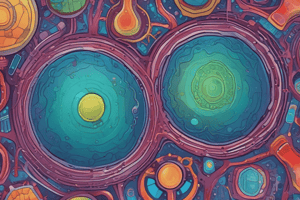Podcast
Questions and Answers
What is the primary function of the mitochondria in a cell?
What is the primary function of the mitochondria in a cell?
- Waste management
- Storing genetic information
- Protein synthesis
- Generating energy for the cell (correct)
Which type of cell lacks a true nucleus?
Which type of cell lacks a true nucleus?
- Eukaryotic cell
- Stem cell
- Prokaryotic cell (correct)
- Differentiated cell
What is the term for the process of cell division that results in two daughter cells with the same number of chromosomes as the parent cell?
What is the term for the process of cell division that results in two daughter cells with the same number of chromosomes as the parent cell?
- Interphase
- Mitosis (correct)
- Meiosis
- Cytokinesis
What is the function of the Golgi apparatus in a cell?
What is the function of the Golgi apparatus in a cell?
What is the term for the jelly-like substance inside the cell where metabolic processes take place?
What is the term for the jelly-like substance inside the cell where metabolic processes take place?
What is the function of lysosomes in a cell?
What is the function of lysosomes in a cell?
What is the term for the process of cell growth and preparation for cell division?
What is the term for the process of cell growth and preparation for cell division?
What is the function of the endoplasmic reticulum (ER) in a cell?
What is the function of the endoplasmic reticulum (ER) in a cell?
Flashcards are hidden until you start studying
Study Notes
Cell Structure
- Plasma membrane: semi-permeable membrane that separates the cell from its environment
- Cytoplasm: jelly-like substance inside the cell where metabolic processes take place
- Nucleus: control center of the cell where DNA is stored
- Mitochondria: organelles responsible for generating energy for the cell
- Endoplasmic reticulum (ER): network of membranous tubules and cisternae involved in protein synthesis and transport
- Ribosomes: small organelles found throughout the cytoplasm, responsible for protein synthesis
- Lysosomes: membrane-bound sacs that contain digestive enzymes and help break down and recycle cellular waste
- Golgi apparatus: complex of flattened sacs and tubules involved in protein modification and transport
Cell Functions
- Metabolism: cells carry out a variety of chemical reactions to maintain homeostasis and energy production
- Growth and Development: cells grow, divide, and differentiate to form tissues and organs
- Response to Stimuli: cells respond to external stimuli, such as light, temperature, and touch
- Waste Management: cells recycle and eliminate waste products
- Reproduction: cells divide to produce new cells
Cell Types
- Prokaryotic cells: lack a true nucleus, found in bacteria and archaea
- Eukaryotic cells: have a true nucleus, found in plants, animals, fungi, and protists
- Stem cells: undifferentiated cells that can differentiate into specialized cells
- Differentiated cells: specialized cells that perform specific functions
Cell Cycle
- Interphase: period of cell growth and preparation for cell division
- Mitosis: process of cell division that results in two daughter cells with the same number of chromosomes as the parent cell
- Cytokinesis: process of cell division that results in the physical separation of the daughter cells
Cell Structure
- Plasma membrane is semi-permeable, regulating what enters and leaves the cell
- Cytoplasm is a jelly-like substance where metabolic processes take place, maintaining cellular activities
- Nucleus is the control center, storing DNA and regulating cellular functions
- Mitochondria generate energy for the cell through cellular respiration
- Endoplasmic reticulum (ER) is a network of membranous tubules and cisternae involved in protein synthesis and transport, modifying and packaging proteins
- Ribosomes are small organelles found throughout the cytoplasm, responsible for protein synthesis by translating mRNA into amino acid chains
- Lysosomes contain digestive enzymes, breaking down and recycling cellular waste and foreign substances
- Golgi apparatus is a complex of flattened sacs and tubules, modifying and transporting proteins and lipids for secretion or use within the cell
Cell Functions
- Metabolic reactions occur in cells to maintain homeostasis and energy production, involving glycolysis, citric acid cycle, and oxidative phosphorylation
- Cells grow, divide, and differentiate to form tissues and organs, driven by signaling pathways and gene expression
- Cells respond to external stimuli, such as light, temperature, and touch, through signaling pathways and gene regulation
- Waste management involves the breakdown and recycling of cellular waste and foreign substances, preventing toxicity and maintaining cellular health
- Reproduction involves cell division, resulting in new cells that can further grow, divide, and differentiate
Cell Types
- Prokaryotic cells lack a true nucleus, with genetic material floating in the cytoplasm, characteristic of bacteria and archaea
- Eukaryotic cells have a true nucleus, separating genetic material from the cytoplasm, characteristic of plants, animals, fungi, and protists
- Stem cells are undifferentiated cells that can differentiate into specialized cells, playing a crucial role in development and tissue repair
- Differentiated cells are specialized cells that perform specific functions, such as nerve cells, muscle cells, and epithelial cells
Cell Cycle
- Interphase is the period of cell growth and preparation for cell division, involving G1, S, and G2 phases
- Mitosis is the process of cell division that results in two daughter cells with the same number of chromosomes as the parent cell, involving prophase, metaphase, anaphase, and telophase
- Cytokinesis is the process of cell division that results in the physical separation of the daughter cells, occurring after mitosis
Studying That Suits You
Use AI to generate personalized quizzes and flashcards to suit your learning preferences.





